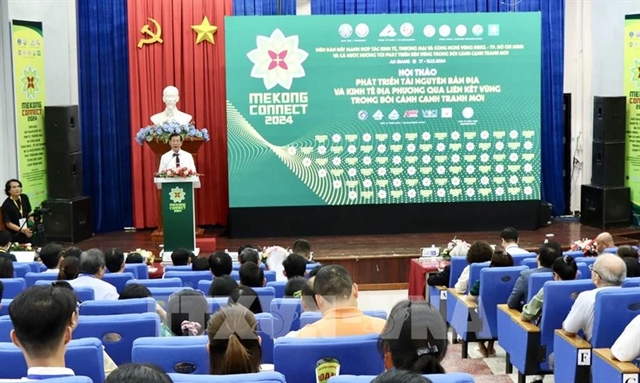Nature-based initiatives key to mitigating climate change in Mekong Delta: WWF
Society – Economy - Ngày đăng : 18:54, 20/12/2024
 |
| Speakers at the recently held Mekong Connect 2024 forum held in An Giang Province. — VNA/VNS Photo |
HCM CITY — Nature-based initiatives are crucial to address the escalating impact of climate change in the Cửu Long (Mekong) Delta, speakers said at a forum.
Speaking at the recent Mekong Connect 2024 forum in An Giang Province, Lưu Thị Lan, Project Manager for Nature-based Solutions at World Wide Fund for Nature (WWF) Vietnam, said the region, which is among the five most vulnerable deltas worldwide, is facing multiple challenges related to the impact of climate change.
The problems include sediment loss resulting from upstream hydropower projects, freshwater scarcity, land subsidence, and saltwater intrusion, she said.
To tackle the challenges, WWF Vietnam is executing the Mekong Nature-based Solutions project, which aims to support local communities in adapting to climate change.
The initiative seeks to restore natural water flow, encourage sediment accumulation, and develop adaptive livelihood models to promote sustainable development within the region, she said.
The project includes seven pilot flood-based livelihood models spanning 170 hectares, featuring activities such as flood-season fish stocking, ecotourism, and floating rice cultivation.
Preliminary data from WWF showed that these models yield a return on investment between 1.2 to 1.5 times, decrease fertiliser usage by 20-30 per cent in subsequent rice crops, and enhance sediment deposition capacity by 20-30 times compared to traditional triple-crop rice farming practices.
In addition, these models contribute to the enhancement of fishery resources and biodiversity.
“While some households initially experienced losses, the environmental benefits are becoming increasingly apparent,” Lan noted.
Linkages and cooperation
Experts have called for Mekong Delta localities to strengthen economic ties with HCM City, optimise resources, and focus on green, sustainable development.
Minister of Science and Technology Huỳnh Thành Đạt highlighted that enhancing cooperation is vital for tackling climate change challenges in the region.
Vice Chairman of HCM City People’s Committee Dương Ngọc Hải said regional cooperation has not reached its full potential due to various challenges related to natural conditions, infrastructure, investment and governance, among others.
Chairman of An Giang Province People’s Committee Hồ Văn Mừng stated that the province is committed to boosting regional linkages for climate action and sustainable development.
As the agricultural nucleus of Việt Nam, the Mekong Delta contributes over 95 per cent of the nation’s rice exports, 60 per cent of aquatic product exports, and 70 per cent of fruit production.
Spanning more than 40,000 sq.m, the region is home to over 20 million residents.
However, its vital role in Việt Nam’s economy and food security is significantly threatened, experts warned.
Mekong Delta is one of the five most vulnerable regions globally, alongside the Ganges River Delta (India and Bangladesh), Mississippi River Delta (the US), Volta River Delta (Ghana), and Nile River Delta (Egypt).
Founded in 1961, WWF is a Swiss-based non-governmental organisation focused on wilderness preservation and minimizing human environmental impact.
First held in 2015, the annual two-day forum has become a major platform for connecting cities and provinces in the Mekong Delta with HCM City and other regions across Việt Nam. — VNS
